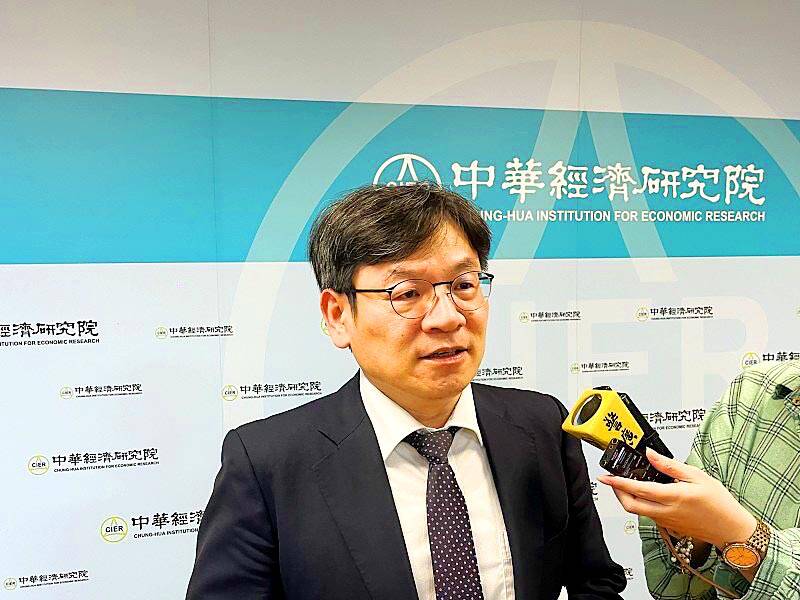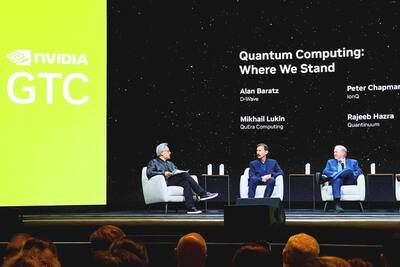Chung-Hua Institution for Economic Research (CIER, 中華經濟研究院) yesterday raised its forecast for Taiwan’s GDP growth from 3.1 percent to 3.38 percent, as exports could receive a bigger boost from global artificial intelligence (AI) demand.
“The nation’s exports would start to set sail from this quarter, thanks to better order visibility,” CIER president Yeh Chun-hsien (葉俊顯) said.
Exports, the main growth driver that accounts for 60 percent of GDP, would shift from a 9.8 percent decline last year to a 7.89 percent increase this year, as inventory adjustments come to a close, the think tank said.

Photo: Hsu Tzu-ling, Taipei Times
The low base last year would also help and explain why the recovery momentum would ease off quarter by quarter, Yeh said.
GDP growth is predicted to reach 5.57 percent last quarter, and to slow to 3.55 percent this quarter, 3 percent next quarter and 1.66 percent in the final quarter, he added.
Global AI demand has been stronger than expected and would ramp up businesses of local tech firms on its supply chain, Yeh said.
Revenue from AI server chips would more than double this year and would account for 20 percent of overall sales by 2028 from a contribution that is currently in the low teens, Taiwan Semiconductor Manufacturing Co (TSMC, 台積電) told investors on Thursday.
Yeh said the upward revision also aims to reflect an increase in government expenditure that would expand 2.68 percent this year to build up national defense and armament procurements.
Private consumption would register a healthy 2.09 percent gain, falling from an 8.32 percent uptick, as demand for outbound travel holds sturdy, especially after an earthquake which measured a 7.2 on the Richter scale jolted Hualien on April 3 and is expected to hinder tourism in eastern Taiwan, Yeh added.
CIER has a dim view on private investment, saying that the GDP component would shrink 0.2 percent this year after a deep 11.6 percent retreat last year.
Local firms remain cautious about capital spending, as the US Federal Reserve appears unlikely to cut interest rates anytime soon and Taiwan’s central bank last month unexpectedly raised borrowing costs by 0.125 percentage points, Yeh said.
Sticky inflation and spiking geopolitical tensions lent support to a conservative approach, he added.
CIER is looking at an inflation of 2.3 percent, which is above the central bank’s 2 percent alarm, mitigating little from a 2.49 percent rise last year.

Anna Bhobho, a 31-year-old housewife from rural Zimbabwe, was once a silent observer in her home, excluded from financial and family decisionmaking in the deeply patriarchal society. Today, she is a driver of change in her village, thanks to an electric tricycle she owns. In many parts of rural sub-Saharan Africa, women have long been excluded from mainstream economic activities such as operating public transportation. However, three-wheelers powered by green energy are reversing that trend, offering financial opportunities and a newfound sense of importance. “My husband now looks up to me to take care of a large chunk of expenses,

SECTOR LEADER: TSMC can increase capacity by as much as 20 percent or more in the advanced node part of the foundry market by 2030, an analyst said Taiwan Semiconductor Manufacturing Co (TSMC, 台積電) is expected to lead its peers in the advanced 2-nanometer process technology, despite competition from Samsung Electronics Co and Intel Corp, TrendForce Corp analyst Joanne Chiao (喬安) said. TSMC’s sophisticated products and its large production scale are expected to allow the company to continue dominating the global 2-nanometer process market this year, Chiao said. The world’s largest contract chipmaker is scheduled to begin mass production of chips made on the 2-nanometer process in its Hsinchu fab in the second half of this year. It would also hold a ceremony on Monday next week to

TECH CLUSTER: The US company’s new office is in the Shalun Smart Green Energy Science City, a new AI industry base and cybersecurity hub in southern Taiwan US chip designer Advanced Micro Devices Inc (AMD) yesterday launched an office in Tainan’s Gueiren District (歸仁), marking a significant milestone in the development of southern Taiwan’s artificial intelligence (AI) industry, the Tainan City Government said in a statement. AMD Taiwan general manager Vincent Chern (陳民皓) presided over the opening ceremony for the company’s new office at the Shalun Smart Green Energy Science City (沙崙智慧綠能科學城), a new AI industry base and cybersecurity hub in southern Taiwan. Facilities in the new office include an information processing center, and a research and development (R&D) center, the Tainan Economic Development Bureau said. The Ministry

Nvidia is to open a quantum computing research lab in Boston, where it plans to collaborate with scientists from Harvard University and the Massachusetts Institute of Technology, Nvidia CEO Jensen Huang (黃仁勳) said on Thursday. Huang made the announcement at Nvidia’s annual software developer conference in San Jose, California, where the company held a day of events focused on quantum computing. Nvidia added the program after Huang in January said that useful quantum computers are 20 years away, comments that he sought to walk back on Thursday while joined onstage by executives from quantum computing firms. “This is the first event in history